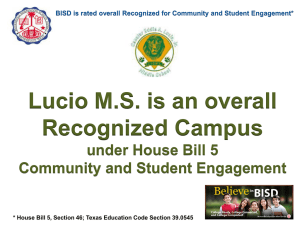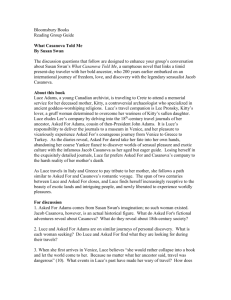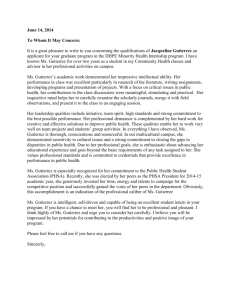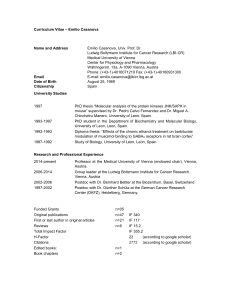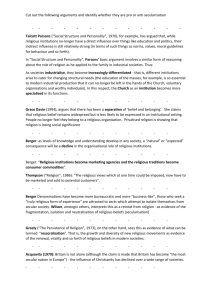CHMSC-CRIM CLJ 4 Rule 130, Sec.37 Case No. 1 People vs
advertisement
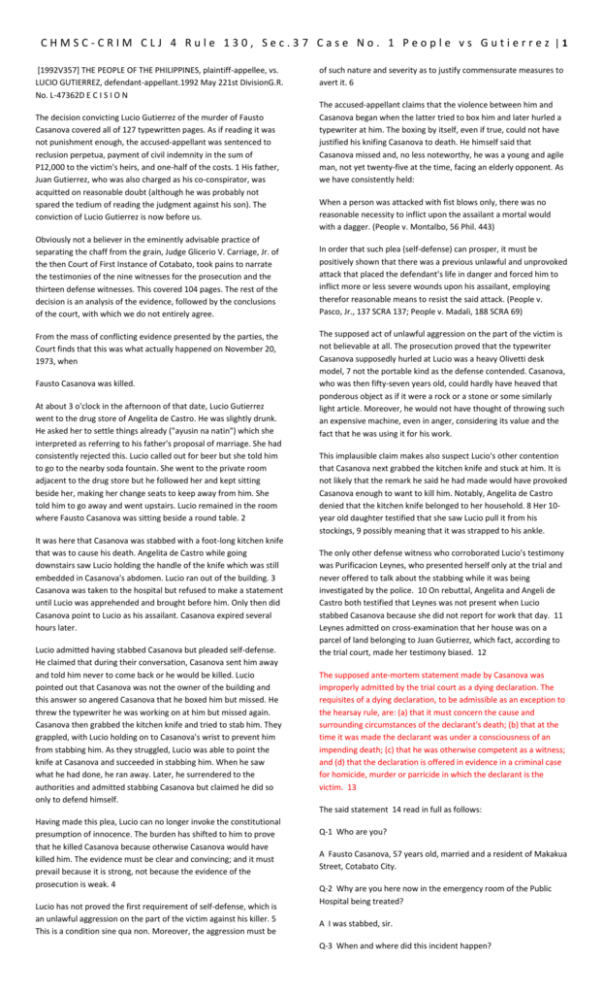
CHMSC-CRIM CLJ 4 Rule 130, Sec.3 7 Case No. 1 People vs Gutierrez |1 [1992V357] THE PEOPLE OF THE PHILIPPINES, plaintiff-appellee, vs. LUCIO GUTIERREZ, defendant-appellant.1992 May 221st DivisionG.R. No. L-47362D E C I S I O N The decision convicting Lucio Gutierrez of the murder of Fausto Casanova covered all of 127 typewritten pages. As if reading it was not punishment enough, the accused-appellant was sentenced to reclusion perpetua, payment of civil indemnity in the sum of P12,000 to the victim's heirs, and one-half of the costs. 1 His father, Juan Gutierrez, who was also charged as his co-conspirator, was acquitted on reasonable doubt (although he was probably not spared the tedium of reading the judgment against his son). The conviction of Lucio Gutierrez is now before us. Obviously not a believer in the eminently advisable practice of separating the chaff from the grain, Judge Glicerio V. Carriage, Jr. of the then Court of First Instance of Cotabato, took pains to narrate the testimonies of the nine witnesses for the prosecution and the thirteen defense witnesses. This covered 104 pages. The rest of the decision is an analysis of the evidence, followed by the conclusions of the court, with which we do not entirely agree. From the mass of conflicting evidence presented by the parties, the Court finds that this was what actually happened on November 20, 1973, when Fausto Casanova was killed. At about 3 o'clock in the afternoon of that date, Lucio Gutierrez went to the drug store of Angelita de Castro. He was slightly drunk. He asked her to settle things already ("ayusin na natin") which she interpreted as referring to his father's proposal of marriage. She had consistently rejected this. Lucio called out for beer but she told him to go to the nearby soda fountain. She went to the private room adjacent to the drug store but he followed her and kept sitting beside her, making her change seats to keep away from him. She told him to go away and went upstairs. Lucio remained in the room where Fausto Casanova was sitting beside a round table. 2 It was here that Casanova was stabbed with a foot-long kitchen knife that was to cause his death. Angelita de Castro while going downstairs saw Lucio holding the handle of the knife which was still embedded in Casanova's abdomen. Lucio ran out of the building. 3 Casanova was taken to the hospital but refused to make a statement until Lucio was apprehended and brought before him. Only then did Casanova point to Lucio as his assailant. Casanova expired several hours later. Lucio admitted having stabbed Casanova but pleaded self-defense. He claimed that during their conversation, Casanova sent him away and told him never to come back or he would be killed. Lucio pointed out that Casanova was not the owner of the building and this answer so angered Casanova that he boxed him but missed. He threw the typewriter he was working on at him but missed again. Casanova then grabbed the kitchen knife and tried to stab him. They grappled, with Lucio holding on to Casanova's wrist to prevent him from stabbing him. As they struggled, Lucio was able to point the knife at Casanova and succeeded in stabbing him. When he saw what he had done, he ran away. Later, he surrendered to the authorities and admitted stabbing Casanova but claimed he did so only to defend himself. of such nature and severity as to justify commensurate measures to avert it. 6 The accused-appellant claims that the violence between him and Casanova began when the latter tried to box him and later hurled a typewriter at him. The boxing by itself, even if true, could not have justified his knifing Casanova to death. He himself said that Casanova missed and, no less noteworthy, he was a young and agile man, not yet twenty-five at the time, facing an elderly opponent. As we have consistently held: When a person was attacked with fist blows only, there was no reasonable necessity to inflict upon the assailant a mortal would with a dagger. (People v. Montalbo, 56 Phil. 443) In order that such plea (self-defense) can prosper, it must be positively shown that there was a previous unlawful and unprovoked attack that placed the defendant's life in danger and forced him to inflict more or less severe wounds upon his assailant, employing therefor reasonable means to resist the said attack. (People v. Pasco, Jr., 137 SCRA 137; People v. Madali, 188 SCRA 69) The supposed act of unlawful aggression on the part of the victim is not believable at all. The prosecution proved that the typewriter Casanova supposedly hurled at Lucio was a heavy Olivetti desk model, 7 not the portable kind as the defense contended. Casanova, who was then fifty-seven years old, could hardly have heaved that ponderous object as if it were a rock or a stone or some similarly light article. Moreover, he would not have thought of throwing such an expensive machine, even in anger, considering its value and the fact that he was using it for his work. This implausible claim makes also suspect Lucio's other contention that Casanova next grabbed the kitchen knife and stuck at him. It is not likely that the remark he said he had made would have provoked Casanova enough to want to kill him. Notably, Angelita de Castro denied that the kitchen knife belonged to her household. 8 Her 10year old daughter testified that she saw Lucio pull it from his stockings, 9 possibly meaning that it was strapped to his ankle. The only other defense witness who corroborated Lucio's testimony was Purificacion Leynes, who presented herself only at the trial and never offered to talk about the stabbing while it was being investigated by the police. 10 On rebuttal, Angelita and Angeli de Castro both testified that Leynes was not present when Lucio stabbed Casanova because she did not report for work that day. 11 Leynes admitted on cross-examination that her house was on a parcel of land belonging to Juan Gutierrez, which fact, according to the trial court, made her testimony biased. 12 The supposed ante-mortem statement made by Casanova was improperly admitted by the trial court as a dying declaration. The requisites of a dying declaration, to be admissible as an exception to the hearsay rule, are: (a) that it must concern the cause and surrounding circumstances of the declarant's death; (b) that at the time it was made the declarant was under a consciousness of an impending death; (c) that he was otherwise competent as a witness; and (d) that the declaration is offered in evidence in a criminal case for homicide, murder or parricide in which the declarant is the victim. 13 The said statement 14 read in full as follows: Having made this plea, Lucio can no longer invoke the constitutional presumption of innocence. The burden has shifted to him to prove that he killed Casanova because otherwise Casanova would have killed him. The evidence must be clear and convincing; and it must prevail because it is strong, not because the evidence of the prosecution is weak. 4 Lucio has not proved the first requirement of self-defense, which is an unlawful aggression on the part of the victim against his killer. 5 This is a condition sine qua non. Moreover, the aggression must be Q-1 Who are you? A Fausto Casanova, 57 years old, married and a resident of Makakua Street, Cotabato City. Q-2 Why are you here now in the emergency room of the Public Hospital being treated? A I was stabbed, sir. Q-3 When and where did this incident happen? CHMSC-CRIM CLJ 4 Rule 130, Sec.3 7 Case No. 1 People vs Gutierrez |2 A On or about 4:30 o'clock in the afternoon of November 20, 1973, particularly inside the City Drug store, along Makakua St., this City. as to kill Casanova in broad daylight, and in the latter's own dwelling place at that. Q-4 Do you know who stabbed you? Lucio would have expected the presence of members of the household, not to mention other possible witnesses, considering that the scene of the stabbing was adjacent to a drug store and a soda fountain. Customers were not unlikely at that time of day. A Yes, sir, it was Lucio Gutierrez. Q-5 Do you know the reason or reasons why this Lucio Gutierrez stabbed you? A Yes, sir, he has grudge on me due to the case of de Castro vs. Juan Gutierrez, father of Lucio Gutierrez. Q-6 Can you identify him personally if presented before you? A Yes, sir. Q-7 Presenting to you now Lucio Gutierrez inside the emergency room, is he the same person who stabbed you? A Yes, sir, he is the very one. Q-8 How do you feel of the wound you sustained? A It's very painful sir. That is all. Ante Mortem statement was taken in the presence of the ff. witnesses: 1. (SGD) MRS. ANGELITA DE CASTRO 2. (SGD) PATM. F. PEDROSO We cannot accept the conclusion of the trial court that Lucio simply stabbed Casanova while the latter was seated, and even sleeping. The testimony of the 10-year old Angeli strains credibility. The finding that the killing was attended by treachery must be rejected because the peculiar manner of the stabbing alleged by the prosecution has not been adequately established. The qualifying circumstances of treachery and evident premeditation not having been proven and none of the other qualifying circumstances having been alleged or established, the killing of Fausto Casanova must be classified merely as homicide and not murder. There is some doubt as to whether Lucio surrendered or was apprehended. In his own sworn statement, he said he was on his way to surrender to the police when he was arrested, but Constable Melchor Bada said the suspect voluntarily surrendered to him. 19 Resolving the doubt in Lucio's favor, the trial court correctly appreciate the mitigating circumstance of voluntary surrender. We shall do so too. It results that the crime committed being homicide with the mitigating circumstance of voluntary surrender and no aggravating circumstance, the prescribed penalty is reclusion temporal in its minimum period. RIGHT THUMBMARK FAUSTO CASANOVA (Affiant) It is obvious from this statement that it was not made by Casanova under a consciousness of impending death. All he said was that his wound was "very painful." The mere fact that he was under dextrose then and passed away a few hours later did not indicate that he felt he was about to die. At any rate, Casanova's identification of Lucio as his assailant was not really necessary because Lucio himself admitted in open court, and in an earlier sworn statement made some twenty days after the incident, 15 that it was he who stabbed and killed Casanova. The sworn statement was admissible against him, having been freely made by him apparently with the assistance of counsel. It is noteworthy that in that statement Lucio said he grabbed the kitchen knife from the table where Casanova heaved the typewriter at him and that he accidentally stabbed Casanova while parrying his attack. 16 This does not square with his subsequent testimony that it was Casanova who grabbed the knife and that he stabbed the older man during their struggle. 17 The record clearly shows that there was bad blood between the Gutierrezes and Angelita because of some court cases between them and that Casanova was directly involved because of his relationship with Angelita as her uncle and business adviser. 18 When Lucio went to the drugstore and residence of Angelita "slightly drunk," by his own admission, there arose a tense situation that, not surprisingly, resulted in violence and death. The Court is of the considered belief that when Lucio intruded into the drug store and the private room and was told by Casanova to leave and never come back or he would be killed, Lucio's anger, fueled by his mild intoxication, drove him to reach for the knife and plunge it into Casanova's spleen. The killing was done on impulse, at the spur of the moment and not deliberately planned. We find there was no evident premeditation, if only because it is incredible that Lucio would have been so reckless Applying the Indeterminate Sentence Law, the Court hereby imposes upon Lucio Gutierrez the penalty of imprisonment ranging from 8 years to 1 day of prison mayor, as minimum, to 12 years and 1 day of reclusion temporal as maximum. The amount of civil indemnity is increased from P12,000.00 to P50,000.00 conformably to existing doctrine. It is worth noting that after the submission of the briefs of the parties, the accused-appellant filed a Manifestation-Motion 20 informing the Court that Angelita de Castro died sometime in August 1976 and that the property dispute between her estate and the Gutierrezes has been resolved in a Memorandum of Agreement approved by the probate court. Hence, according to the counsel for the accused, 21 "it is respectfully prayed that the case be now dismissed on the ground of said supervening events." Coming from a member of the bar, the statement is nothing short of amazing. It is an axiom known even to a first year law student that a criminal conviction cannot be undone by a civil compromise. 22 WHEREFORE, the appeal is DISMISSED and the conviction of the accused-appellant is AFFIRMED, but only for the crime of homicide, resulting in the modification of the penalty as above discussed. It is so ordered.

